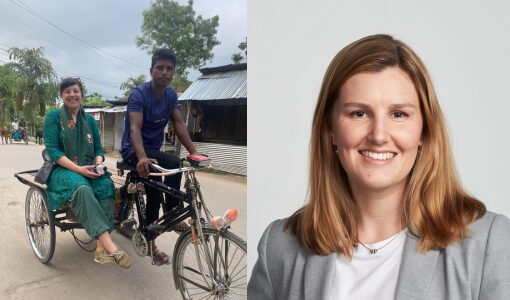
We are delighted to announce that applications are open for 2025 Round 1 of the Franklin Women Carer’s Scholarship! This scholarship aims to reduce the financial and logistical barriers associated with primary caring responsibilities to enable our members to participate in valuable career opportunities, including conferences.
Here Dr Holly Seale, Associate Professor at the School of Population Health and Associate Dean International for the Faculty of Medicine and Health at UNSW Sydney, and Dr Alexandra Hogan, mathematical epidemiologist at UNSW, share their experiences on conferencing with kids.

Ironically, I am writing this commentary from an airport. I am waiting to fly home to Sydney after being in Vietnam for a work trip. It’s my first trip for the year, and I have tried to keep it short. As a mum of two boys, aged 6 and 8, I have been trying to keep work trips as brief as possible.
I have also started to try to restrict my travel to the school holidays. But neither of these things is an easy endeavour
Conferences don’t stick to the NSW school holiday schedule and our southern hemisphere location means that flying anywhere past the equator adds to the number of days of travel. So, it often comes down to negotiation. Negotiation around the number of days, number of trips and the activities that will be undertaken before heading away to reduce the pressure. I have learnt how to book flights (often at ungodly hours) to ensure I arrive home ready for the school pick-up. I travel over weekends as, for my family, being away on school days adds to the stress. While I feel that I have developed the negotiation skills of a UN peacekeeper regarding travel, in truth, I have forgotten how many times the negotiations around travel have ended up in a disagreement. There is a resentment that I am the parent who is heading away. This tension can be a sticking point, so I currently turn down trips to reduce the need to return to the negotiation table.
It is important to note, at this point, that I come from a place of privilege. I have a very supportive partner, and family members living in the same city who can pick up the slack or who can pick up the kids if things go pear-shaped. I am also at a point where I can leave the kids at home and jump on that plane. This is not everyone’s space or preference. In writing this piece, I reached out to my colleague, Dr Alexandra Hogan, who recently published a piece about travelling to conferences with her younger children, for her thoughts on negotiation.
“I also have two young boys. While I have a supportive partner and helpful family members nearby, I need to anticipate the year ahead, prioritising only the most essential work trips, calculating the total number of days away, and deciding if that’s too much to ask of my family. At my current life stage, most of the negotiation is with myself (how many nights can I bear being away from my littlest child) and does the tradeoff in terms of career benefit seem worth it for the disruption? I’m sure it is something that will change, with ups and downs throughout my career.”
I think the bottom line is that the negotiations will continue. But also critically, I have become better at framing my responses to international invites if I cannot attend. I have also tightened up my statements in grants relating to opportunity. Travel is part and parcel of my role, but there must be a balance as I don’t want to miss critical moments for my family; I also don’t want them just to pick up the slack all the time. As a mentor once said, some things also come with time! Kids will get older and less dependent, and the opportunities will continue to be there.
